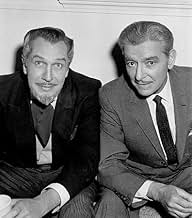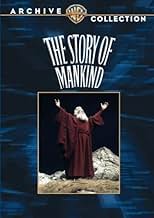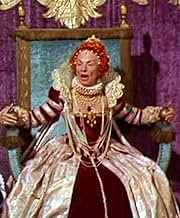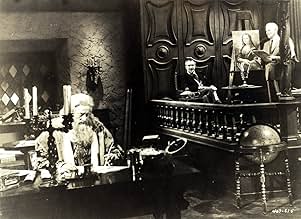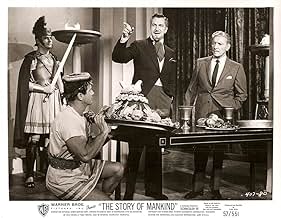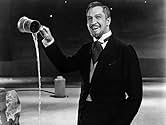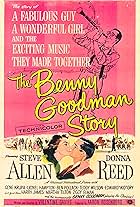IMDb RATING
4.8/10
1.6K
YOUR RATING
The Devil and the Spirit of Man argue as to whether or not humanity is ultimately good or evil.The Devil and the Spirit of Man argue as to whether or not humanity is ultimately good or evil.The Devil and the Spirit of Man argue as to whether or not humanity is ultimately good or evil.
- Director
- Writers
- Stars
- Director
- Writers
- All cast & crew
- Production, box office & more at IMDbPro
Featured reviews
The major draw of THE STORY OF MANKIND is the incredible roster of stars and familiar faces. It seems anybody who was anybody in Hollywood signed on to this movie. Just watch the opening titles. In truth, though, the actors and actresses are mostly a decade or two past their primes and many of the familiar cast members are second-stringers from yesteryear. The biggest names are probably Hedy Lamarr and Ronald Colman, in a cast that also includes Vincent Price, Cedric Hardwicke, John Carradine, Charles Coburn, Franklin Pangborn, Edward Everett Horton, Peter Lorre, Agnes Moorehead, Virginia Mayo, Cathy O'Donnell, Henry Daniell, Melville Cooper, Cesar Romero, a young Dennis Hopper, and the aging Marx Brothers.
The only "stars" of the film are Ronald Colman and Vincent Price, who serve as opposing sides to the argument on the worth of humankind. The movie is set at a celestial trial to determine whether to save mankind or let it destroy itself with its nuclear weapons. (This is an Atomic Age fable.) Colman represents mankind and defends its goodness throughout history. Price is the devil (Mr. Scratch) and reminds the court of the evil in human history.
The well-known actors and actresses only appear on-screen in cameos that last about a minute. They play famous historical figures whose stories serve to prove some point at the trial. Some stars are barely recognizable and some roles have no dialogue. The big names don't have screen time together, except for Price and Colman. (The Marx Bros. are even separated.)
The movie itself is really kind of a letdown. It seems obvious that the historical crowd scenes and action scenes are borrowed from other films, and the new scenes with the cast members are sometimes laughably under-produced. (Watch for the scene showing Joan of Arc's capture.) The mixing and matching is distracting and emphasizes the cheapness of the new footage. And, despite an impressive cast of accomplished Hollywood talent, the cameo performances are mostly terrible. (The highlight is Groucho Marx, putting his spin on the sale of Manhattan.)
As a history lesson, this film won't do. And as an entertainment, it falls pretty far short. The movie is still of interest for the cameos, and it's fun to play "Guess Who That Is" with other movie buffs in the room. But it's disappointing that all of these names couldn't have come together in a better movie. The premise could have been executed better, and I'd be interested in seeing a new attempt at such a star- studded history lesson.
The only "stars" of the film are Ronald Colman and Vincent Price, who serve as opposing sides to the argument on the worth of humankind. The movie is set at a celestial trial to determine whether to save mankind or let it destroy itself with its nuclear weapons. (This is an Atomic Age fable.) Colman represents mankind and defends its goodness throughout history. Price is the devil (Mr. Scratch) and reminds the court of the evil in human history.
The well-known actors and actresses only appear on-screen in cameos that last about a minute. They play famous historical figures whose stories serve to prove some point at the trial. Some stars are barely recognizable and some roles have no dialogue. The big names don't have screen time together, except for Price and Colman. (The Marx Bros. are even separated.)
The movie itself is really kind of a letdown. It seems obvious that the historical crowd scenes and action scenes are borrowed from other films, and the new scenes with the cast members are sometimes laughably under-produced. (Watch for the scene showing Joan of Arc's capture.) The mixing and matching is distracting and emphasizes the cheapness of the new footage. And, despite an impressive cast of accomplished Hollywood talent, the cameo performances are mostly terrible. (The highlight is Groucho Marx, putting his spin on the sale of Manhattan.)
As a history lesson, this film won't do. And as an entertainment, it falls pretty far short. The movie is still of interest for the cameos, and it's fun to play "Guess Who That Is" with other movie buffs in the room. But it's disappointing that all of these names couldn't have come together in a better movie. The premise could have been executed better, and I'd be interested in seeing a new attempt at such a star- studded history lesson.
The technological development of the H-Bomb has caused the court of heaven to put mankind on trial.
Should man not be-allowed to proceed with his new invention or should he be allowed to blow himself to eternity? Somewhere in outer space (for it could hardly be held in heaven) the trial of the centuries takes place. Arguing for allowing man to blow himself up is Scratch (Vincent Price). Arguing for the goodness of mankind is The Spirit of Mankind (Ronald Coleman).
Scratch and Mankind then take the court (and the audience) on a tour throughout history showcasing some of the most interesting and important events and people that have shaped the world in which we live. The premise of the film is similar to a Star Trek: The Next Generation episode where Picard and the Enterprise crew have to defend the obliteration of mankind from a high powerful being known as Q who has put mankind on trial.
It is a film that touches on philosophical and theological issues but is more interested in highlighting historical events so it doesn't become a deep spiritual film filled with profound thought and insight. It starts out with an interesting premise, but as it travels along through history, although still interesting, seems somewhat respective and begins to be a tad bit tedious and thus maybe a little bit boring.
Of the more interesting moments includes Groucho Marx as Peter Minuit who swindled Manhattan Island from the Indians and Harpo Marx as Isaac Newton. Chico Marx plays a monk advising Christopher Columbus about why sailing across the world would be a bad idea. How can you go wrong with the Marx Brothers.
Overall 'The Story of Mankind' is interesting enough to watch especially if it is in a history class. It could have kept the hosts and perhaps could have had more engaging portraits of history. It has a fun premise and some good dialogue between Scratch and Mankind. But as an intriguing and gripping film about history it would be better to go with 'Bill and Ted's Excellent Adventure'.
What does the court decide in the end? At the very least they decide to end the film.
Should man not be-allowed to proceed with his new invention or should he be allowed to blow himself to eternity? Somewhere in outer space (for it could hardly be held in heaven) the trial of the centuries takes place. Arguing for allowing man to blow himself up is Scratch (Vincent Price). Arguing for the goodness of mankind is The Spirit of Mankind (Ronald Coleman).
Scratch and Mankind then take the court (and the audience) on a tour throughout history showcasing some of the most interesting and important events and people that have shaped the world in which we live. The premise of the film is similar to a Star Trek: The Next Generation episode where Picard and the Enterprise crew have to defend the obliteration of mankind from a high powerful being known as Q who has put mankind on trial.
It is a film that touches on philosophical and theological issues but is more interested in highlighting historical events so it doesn't become a deep spiritual film filled with profound thought and insight. It starts out with an interesting premise, but as it travels along through history, although still interesting, seems somewhat respective and begins to be a tad bit tedious and thus maybe a little bit boring.
Of the more interesting moments includes Groucho Marx as Peter Minuit who swindled Manhattan Island from the Indians and Harpo Marx as Isaac Newton. Chico Marx plays a monk advising Christopher Columbus about why sailing across the world would be a bad idea. How can you go wrong with the Marx Brothers.
Overall 'The Story of Mankind' is interesting enough to watch especially if it is in a history class. It could have kept the hosts and perhaps could have had more engaging portraits of history. It has a fun premise and some good dialogue between Scratch and Mankind. But as an intriguing and gripping film about history it would be better to go with 'Bill and Ted's Excellent Adventure'.
What does the court decide in the end? At the very least they decide to end the film.
The Story of Mankind when I saw it was a movie I initially found difficult to rate. Mainly because it is a big mess. Having said that somewhat, it is a mess that is worth seeing.
The production values are hardly high art, but they are decent. The sets are okay, the costumes are interesting and the cinematography is not exceptional but not exactly cheap either. I liked the premise as well, and it started off decently with Sir Cedric Hardwicke presiding over things nicely. There is also some good performances. Ronald Colman gives far from his best performance, but he is very suave and convincing, Marie Antoinette is nicely coquettish and Agnes Moorhead chews the scenery with glee. It was also nice to see the Marx Brothers, Harpo and Chico aren't really that funny but Groucho is though there was the odd moment not to do with Groucho more to do with the writing and the way the characters were written that came across as more offensive than amusing. Best is Vincent Price, with his powerful voice and magnetic presence, he is gleefully wicked.
However, the direction falls flat as if it is unsure of which direction to go whether it wanted to be a history lesson or an exercise in camp. The dialogue is mostly absolutely abysmal, but it is so hard not to laugh at how bad it is. The film goes at an uneven pace with some segments faster than others or better acted and written. The characters are little more than stereotypes and caricatures and badly explored ones at that, and there are some unintentionally hilarious ideas incorporated into the story especially with Joan of Arc. I liked the leads and Moorhead and Groucho, but the rest of the cast are just bizarre. Peter Lorre though isn't too bad, perhaps too young and somewhat too effeminate too but there are some moments of unexpected poignancy, but Hedy Lamarr is woefully miscast as Joan of Arc and a very over-the-top Dennis Hopper does nothing with the role of Napolean.
Overall, The Story of Mankind is a mess, but it was worth watching and I personally wouldn't put it on my worst movies ever list. 4/10 Bethany Cox
The production values are hardly high art, but they are decent. The sets are okay, the costumes are interesting and the cinematography is not exceptional but not exactly cheap either. I liked the premise as well, and it started off decently with Sir Cedric Hardwicke presiding over things nicely. There is also some good performances. Ronald Colman gives far from his best performance, but he is very suave and convincing, Marie Antoinette is nicely coquettish and Agnes Moorhead chews the scenery with glee. It was also nice to see the Marx Brothers, Harpo and Chico aren't really that funny but Groucho is though there was the odd moment not to do with Groucho more to do with the writing and the way the characters were written that came across as more offensive than amusing. Best is Vincent Price, with his powerful voice and magnetic presence, he is gleefully wicked.
However, the direction falls flat as if it is unsure of which direction to go whether it wanted to be a history lesson or an exercise in camp. The dialogue is mostly absolutely abysmal, but it is so hard not to laugh at how bad it is. The film goes at an uneven pace with some segments faster than others or better acted and written. The characters are little more than stereotypes and caricatures and badly explored ones at that, and there are some unintentionally hilarious ideas incorporated into the story especially with Joan of Arc. I liked the leads and Moorhead and Groucho, but the rest of the cast are just bizarre. Peter Lorre though isn't too bad, perhaps too young and somewhat too effeminate too but there are some moments of unexpected poignancy, but Hedy Lamarr is woefully miscast as Joan of Arc and a very over-the-top Dennis Hopper does nothing with the role of Napolean.
Overall, The Story of Mankind is a mess, but it was worth watching and I personally wouldn't put it on my worst movies ever list. 4/10 Bethany Cox
Irwin Allen's first venture into all star spectacle was one all star disaster. The Story of Mankind contains some of the most incredible casting decisions of all time. Virginia Mayo as the blond Cleopatra, Dennis Hopper chewing the scenery with Napoleon, Peter Lorre dining on the scenery for weeks as Nero, Marie Wilson as Marie Antoinette as a roadshow Marilyn Monroe, that's just some of them.
The film also is known for being the last film which featured all three of the Marx Brothers though they all have different roles. Chico plays a monk who is Christopher Columbus's confidante, Groucho euchres the Indians out of Manhattan island as Peter Minuit, and most astonishing of all, Harpo Marx as Sir Isaac Newton who discovers gravity when an apple conks him on the bean.
Holding all these portrayals together is a story where mankind itself is being judged. A super H Bomb is about to be discovered and let loose will do in the world's population. It's Judgement Day a coming.
But mankind has its advocates and detractors. Speaking for the prosecution is Old Scratch who's been bringing the worst out in man for centuries in the form of Vincent Price. But man has his good side as well and who better than Ronald Colman to demonstrate man at his most civilized best. Colman and Price plead their case before The Judge played by Cedric Hardwicke.
In those three individuals you have some of the finest speaking voices the English language ever knew. When the film is on them as they each bring out the exhibits for their case it's a pleasure to listen to. Then when the focus is on the individual stories, you want to scream in agony.
What was Irwin Allen driving at, I'm still trying to figure it out. Was he deliberately camping it up with some of these casting decisions? If it was satire, it just doesn't get off the ground.
This was Ronald Colman's farewell film and while it's hardly something I'd like to go out on, I can't think of any man who could have stated the case for civilization any better.
So when you see The Story of Mankind, fast forward through some of the exhibits and treasure every moment the advocates are before the judge.
The film also is known for being the last film which featured all three of the Marx Brothers though they all have different roles. Chico plays a monk who is Christopher Columbus's confidante, Groucho euchres the Indians out of Manhattan island as Peter Minuit, and most astonishing of all, Harpo Marx as Sir Isaac Newton who discovers gravity when an apple conks him on the bean.
Holding all these portrayals together is a story where mankind itself is being judged. A super H Bomb is about to be discovered and let loose will do in the world's population. It's Judgement Day a coming.
But mankind has its advocates and detractors. Speaking for the prosecution is Old Scratch who's been bringing the worst out in man for centuries in the form of Vincent Price. But man has his good side as well and who better than Ronald Colman to demonstrate man at his most civilized best. Colman and Price plead their case before The Judge played by Cedric Hardwicke.
In those three individuals you have some of the finest speaking voices the English language ever knew. When the film is on them as they each bring out the exhibits for their case it's a pleasure to listen to. Then when the focus is on the individual stories, you want to scream in agony.
What was Irwin Allen driving at, I'm still trying to figure it out. Was he deliberately camping it up with some of these casting decisions? If it was satire, it just doesn't get off the ground.
This was Ronald Colman's farewell film and while it's hardly something I'd like to go out on, I can't think of any man who could have stated the case for civilization any better.
So when you see The Story of Mankind, fast forward through some of the exhibits and treasure every moment the advocates are before the judge.
THE STORY OF MANKIND (1957) is not a good movie, but it's a fascinating one on several levels. I'm most intrigued by the central event of the film, a debate over the fate of mankind undertaken, in a heavenly tribunal, between the "Spirit of Man," played by stately English actor Ronald Colman (in his final film), and a rather more sinuous type, Mr. Scratch (aka the Devil), played by Vincent Price on the cusp of his emergence as a major horror star. Colman speaks in defense of mankind, while Price argues for allowing the species' impending self-engineered demise. (This was the Atomic Age, after all.) Price offers concrete examples of man's inhumanity to man (and nature) and the various atrocities the race has committed, establishing a whole pattern of misconduct—theft, exploitation, slavery, mass murder, rape, pillage, plunder, perversion--that extends from Ancient Egypt right up to the present day. Colman glosses over these things, preferring to expound rather vaguely on man's lofty ideals and dreams of progress, exploration, and artistic achievement. When Colman brings up Leonardo da Vinci, for instance, Price points to da Vinci's detailed plans for highly destructive weapons of war. Price seems much more outraged by the crimes of mankind than Colman is, which marks his character as the true moralist in the film.
(In real life, Colman and Price were good friends and one exchange of dialogue in the da Vinci scene, where Colman insists that Price "knows nothing about painting," while Price responds that he "never pretended to be an art expert," is an in-joke reference to Price's already considerable reputation by that point as a connoisseur, collector and historian of art.)
On a more mundane note of cinephilic appreciation, I tried tallying up all the footage taken from earlier movies with historical themes. (Any time you see a shot with multiple extras and lavish sets, you know it's from a different movie.) Early on, for instance, we see John Carradine as the pharaoh, Khufu, sharing a scene with Price and Cedric Hardwicke (as the celestial judge). All three were in Cecil B. DeMille's spectacle from the previous year, THE TEN COMMANDMENTS (1956), which took place in Ancient Egypt. Yet when this scene transitions to shots of pyramid building, they don't use clips from DeMille's film, but instead rely on clips from another film set in that period—LAND OF THE PHARAOHS (1955). Why? Because THE STORY OF MANKIND is a Warner Bros. production and the only color film clips they could use without having to pay exorbitant fees would have to come from Warner Bros. films. So when they go to the Trojan War, we see clips from HELEN OF TROY (1955). And when they go to the Crusades and other scenes from the Middle Ages, we see clips from KING RICHARD AND THE CRUSADERS (1954). Piracy and ship battles between England and Spain for supremacy of the seas? CAPTAIN HORATIO HORNBLOWER (1951). Elizabethan England? THE PRIVATE LIVES OF ELIZABETH AND ESSEX (1939). Western scenes? DODGE CITY (1939). There were some clips I didn't recognize, though, such as the shot of Rome burning. (QUO VADIS?, 1951, was an MGM production.) Producer-director Irwin Allen would expand on this practice of mixing cheaply shot studio scenes with more lavishly filmed clips in his TV series, "Time Tunnel," some nine years later. (By then, of course, Allen would be at a different studio and have to rely on clips solely from 20th Century Fox.)
The recent cablecast of this film on Turner Classic Movies (on March 14, 2011) was beset by technical problems. The film often froze up and went black. This happened most egregiously during two sequences, one with Cleopatra (Virginia Mayo) and one with Peter Minuit (Groucho Marx), so I missed several seconds from each. I must say I didn't recognize Ms. Mayo in the dark wig. In another sequence, 45-year-old Hedy Lamarr turns up as the teenaged Joan of Arc(!). Marie Windsor plays a much taller and older Josephine to Dennis Hopper's Napoleon. (Josephine actually WAS taller and older than Napoleon, but not by that much.) Shakespeare is described by Queen Elizabeth (Agnes Moorehead) as a "young actor-poet," but is played by veteran character actor Reginald Gardiner, who'd been in films for 25 years at this point. Why couldn't they recruit bigger names to play Shakespeare and such other key historical figures as Columbus (Anthony Dexter) and Lincoln (Austin Green)?
Silent star Francis X. Bushman (Messala in the silent BEN-HUR) plays da Vinci—and has no dialogue. Cathy O'Donnell plays an early Christian in Rome some two years before appearing in a vaguely similar role in the BEN-HUR remake. In one piece of gimmick casting, Jim Ameche appears as Alexander Graham Bell, a role closely identified with his more famous brother, Don Ameche. (I'm guessing they tried to get Don to recreate it, but were turned down.) Seven actors in this cast went on to guest star on TV's "Batman": Vincent Price, Cesar Romero, Reginald Gardiner, Edward Everett Horton, Francis X. Bushman, Marie Windsor and Ziva Rodann.
For years I only knew this film as the last to feature all three Marx Brothers. On that basis, I'd always thought it was a comedy. It isn't. Still, it struck me as pretty funny to see an opening credits sequence where Francis X. Bushman, Franklin Pangborn and Dennis Hopper are among the many listed together ABOVE the title.
(In real life, Colman and Price were good friends and one exchange of dialogue in the da Vinci scene, where Colman insists that Price "knows nothing about painting," while Price responds that he "never pretended to be an art expert," is an in-joke reference to Price's already considerable reputation by that point as a connoisseur, collector and historian of art.)
On a more mundane note of cinephilic appreciation, I tried tallying up all the footage taken from earlier movies with historical themes. (Any time you see a shot with multiple extras and lavish sets, you know it's from a different movie.) Early on, for instance, we see John Carradine as the pharaoh, Khufu, sharing a scene with Price and Cedric Hardwicke (as the celestial judge). All three were in Cecil B. DeMille's spectacle from the previous year, THE TEN COMMANDMENTS (1956), which took place in Ancient Egypt. Yet when this scene transitions to shots of pyramid building, they don't use clips from DeMille's film, but instead rely on clips from another film set in that period—LAND OF THE PHARAOHS (1955). Why? Because THE STORY OF MANKIND is a Warner Bros. production and the only color film clips they could use without having to pay exorbitant fees would have to come from Warner Bros. films. So when they go to the Trojan War, we see clips from HELEN OF TROY (1955). And when they go to the Crusades and other scenes from the Middle Ages, we see clips from KING RICHARD AND THE CRUSADERS (1954). Piracy and ship battles between England and Spain for supremacy of the seas? CAPTAIN HORATIO HORNBLOWER (1951). Elizabethan England? THE PRIVATE LIVES OF ELIZABETH AND ESSEX (1939). Western scenes? DODGE CITY (1939). There were some clips I didn't recognize, though, such as the shot of Rome burning. (QUO VADIS?, 1951, was an MGM production.) Producer-director Irwin Allen would expand on this practice of mixing cheaply shot studio scenes with more lavishly filmed clips in his TV series, "Time Tunnel," some nine years later. (By then, of course, Allen would be at a different studio and have to rely on clips solely from 20th Century Fox.)
The recent cablecast of this film on Turner Classic Movies (on March 14, 2011) was beset by technical problems. The film often froze up and went black. This happened most egregiously during two sequences, one with Cleopatra (Virginia Mayo) and one with Peter Minuit (Groucho Marx), so I missed several seconds from each. I must say I didn't recognize Ms. Mayo in the dark wig. In another sequence, 45-year-old Hedy Lamarr turns up as the teenaged Joan of Arc(!). Marie Windsor plays a much taller and older Josephine to Dennis Hopper's Napoleon. (Josephine actually WAS taller and older than Napoleon, but not by that much.) Shakespeare is described by Queen Elizabeth (Agnes Moorehead) as a "young actor-poet," but is played by veteran character actor Reginald Gardiner, who'd been in films for 25 years at this point. Why couldn't they recruit bigger names to play Shakespeare and such other key historical figures as Columbus (Anthony Dexter) and Lincoln (Austin Green)?
Silent star Francis X. Bushman (Messala in the silent BEN-HUR) plays da Vinci—and has no dialogue. Cathy O'Donnell plays an early Christian in Rome some two years before appearing in a vaguely similar role in the BEN-HUR remake. In one piece of gimmick casting, Jim Ameche appears as Alexander Graham Bell, a role closely identified with his more famous brother, Don Ameche. (I'm guessing they tried to get Don to recreate it, but were turned down.) Seven actors in this cast went on to guest star on TV's "Batman": Vincent Price, Cesar Romero, Reginald Gardiner, Edward Everett Horton, Francis X. Bushman, Marie Windsor and Ziva Rodann.
For years I only knew this film as the last to feature all three Marx Brothers. On that basis, I'd always thought it was a comedy. It isn't. Still, it struck me as pretty funny to see an opening credits sequence where Francis X. Bushman, Franklin Pangborn and Dennis Hopper are among the many listed together ABOVE the title.
Storyline
Did you know
- TriviaIrwin Allen managed to assemble his all-star cast by promising them they would only be filming for one day and that they would get paid $25,000 for doing so.
- GoofsThe cheap production values of this film resulted in many anachronisms. Some of the most obvious include: In ancient Greece, the hand of Plato is shown writing in cursive with a stylus, but he has no inkwell, and his shirtsleeve (on a toga?) looks more medieval or renaissance. In the next shot, Aristotle is surrounded by bubbling glass beakers filled with colored liquids, a la Victor Frankenstein's laboratory. The Indian who sells Manhattan sits in front of a Plains tribe tepee and wears a full Western war bonnet.
- Quotes
Mr. Scratch: Then, came the red man, fighting for his very survival and the white man determined to take away this so-called god-given heritage, used the foulest of methods. Rather confusing, don't you think?
- ConnectionsEdited from The Adventures of Robin Hood (1938)
Details
- Release date
- Country of origin
- Languages
- Also known as
- La historia de la humanidad
- Filming locations
- Production company
- See more company credits at IMDbPro
- Runtime1 hour 40 minutes
- Aspect ratio
- 1.66 : 1
Contribute to this page
Suggest an edit or add missing content




